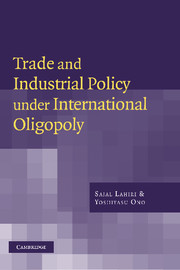Book contents
- Frontmatter
- Contents
- List of figures
- List of tables
- Preface
- Introduction
- 1 Cost asymmetry and industrial policy in a closed economy
- 2 R&D policy
- 3 Trade and industrial policy under foreign penetration
- 4 Trade and industrial policy under asymmetric oligopoly: a synthesis
- 5 Trade policy when producers and sellers differ
- 6 Foreign penetration in the presence of unemployment
- 7 Local content requirement and profit taxation
- 8 Export-oriented foreign direct investment
- 9 Lobbying for local content requirement
- 10 Foreign direct investment in the presence of cross-hauling
- Bibliography
- Index
Introduction
Published online by Cambridge University Press: 22 September 2009
- Frontmatter
- Contents
- List of figures
- List of tables
- Preface
- Introduction
- 1 Cost asymmetry and industrial policy in a closed economy
- 2 R&D policy
- 3 Trade and industrial policy under foreign penetration
- 4 Trade and industrial policy under asymmetric oligopoly: a synthesis
- 5 Trade policy when producers and sellers differ
- 6 Foreign penetration in the presence of unemployment
- 7 Local content requirement and profit taxation
- 8 Export-oriented foreign direct investment
- 9 Lobbying for local content requirement
- 10 Foreign direct investment in the presence of cross-hauling
- Bibliography
- Index
Summary
Issues
In a typical competitive economy most policy interventions cause some distortions and thus reduce national welfare. In other words, laissez faire is the best option for the government in charge. In a real world, however, there are various preexisting distortions that introduce non-competitiveness in product and/or factor markets, and these make some interventions welfare enhancing. Oligopoly and unemployment are two common and important such examples.
In the presence of oligopoly, for example, producers, because of their market power, are able to reduce output so that they earn excess profits at the cost of a decrease in consumers' surplus. Hence, it is commonly believed that a policy that encourages more competition among firms is desirable. In fact, this belief forms the backbone of most antitrust policies in the world. If as an extreme measure oligopolistic distortions can completely be removed, first-best will be achieved. In reality, however, such an extreme measure is difficult to implement for, inter alia, political-economic and technological reasons. We are then left in a second-best scenario and more competition may not always be welfare improving in such situations. When oligopoly and unemployment co-exist, the interactions between these two distortions may work in unexpected ways giving rise to more perverse outcomes in terms of second-best policies.
There is of course a very substantial literature on trade and industrial policies under oligopoly, both in the presence and absence of unemployment (see Brander, 1995; Helpman and Krugman, 1986, 1989 and Suzumura, 1995 for surveys of the literature).
- Type
- Chapter
- Information
- Publisher: Cambridge University PressPrint publication year: 2003



